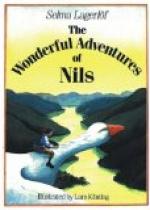Think now first and foremost of the sea! Far out it lies desolate and empty and big, and has nothing else to do but to roll its gray billows. When it comes toward the land, it happens across the first obstacle. This it immediately overpowers; tears away everything green, and makes it as gray as itself. Then it meets still another obstacle. With this it does the same thing. And still another. Yes, the same thing happens to this also. It is stripped and plundered, as if it had fallen into robbers’ hands. Then the obstacles come nearer and nearer together, and then the sea must understand that the land sends toward it her littlest children, in order to move it to pity. It also becomes more friendly the farther in it comes; rolls its waves less high; moderates its storms; lets the green things stay in cracks and crevices; separates itself into small sounds and inlets, and becomes at last so harmless in the land, that little boats dare venture out on it. It certainly cannot recognise itself—so mild and friendly has it grown.
And then think of the hillside! It lies uniform, and looks the same almost everywhere. It consists of flat grain-fields, with one and another birch-grove between them; or else of long stretches of forest ranges. It appears as if it had thought about nothing but grain and turnips and potatoes and spruce and pine. Then comes a sea-fiord that cuts far into it. It doesn’t mind that, but borders it with birch and alder, just as if it was an ordinary fresh-water lake. Then still another wave comes driving in. Nor does the hillside bother itself about cringing to this, but it, too, gets the same covering as the first one. Then the fiords begin to broaden and separate, they break up fields and woods and then the hillside cannot help but notice them. “I believe it is the sea itself that is coming,” says the hillside, and then it begins to adorn itself. It wreathes itself with blossoms, travels up and down in hills and throws islands into the sea. It no longer cares about pines and spruces, but casts them off like old every day clothes, and parades later with big oaks and lindens and chestnuts, and with blossoming leafy bowers, and becomes as gorgeous as a manor-park. And when it meets the sea, it is so changed that it doesn’t know itself. All this one cannot see very well until summertime; but, at any rate, the boy observed how mild and friendly nature was; and he began to feel calmer than he had been before, that night. Then, suddenly, he heard a sharp and ugly yowl from the bath-house park; and when he stood up he saw, in the white moonlight, a fox standing on the pavement under the balcony. For Smirre had followed the wild geese once more. But when he had found the place where they were quartered, he had understood that it was impossible to get at them in any way; then he had not been able to keep from yowling with chagrin.
When the fox yowled in this manner, old Akka, the leader-goose, was awakened. Although she could see nothing, she thought she recognised the voice. “Is it you who are out to-night, Smirre?” said she. “Yes,” said Smirre, “it is I; and I want to ask what you geese think of the night that I have given you?”




